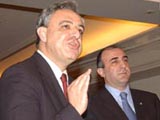|
|
TODAY.AZ / Politics
No progress in fresh Armenian-Azeri talks
14 March 2007 [21:54] - TODAY.AZ

Speaking by telephone shortly after the talks with his Azerbaijani counterpart Elmar Mammadyarov, Armenian Foreign Minister Vartan Oskanian told RFE/RL on Wednesday the two sides still have "deep differences" over unspecified key details of a peace accord drafted by international mediators. He said they agreed to meet again next month in another attempt to lay the groundwork for a potentially decisive meeting of the Armenian and Azerbaijani presidents.
"I thought that these negotiations should take place in a bit more smooth manner, but this was not the case. They were quite difficult and complicated," Oskanian said without elaborating.
"But this is understandable as we are increasingly going into the details of the basic principles [proposed by the mediators.] That is why new complications keep emerging," he added.
Mammadyarov did not immediately comment on the Geneva talks.
The American, French and Russian mediators want Presidents Ilham Aliyev and Robert Kocharian to meet and cut a framework peace deal shortly after Armenia's upcoming parliamentary elections. The three co-chairs of the OSCE Minsk Group hoped that Oskanian and Mammadyarov will minimize the conflicting parties' remaining differences on the basic principles of a Karabakh settlement.
Oskanian insisted that this may still happen at the next meeting of the foreign ministers, arguing that the parties have already created "quite a solid base" for reaching agreement. "There is a document on the table," he said. "We believe it is a fairly serious document that allows for a solution to the problem."
The proposed peace deal calls for a gradual settlement of the Karabakh dispute that would culminate in a referendum of self-determination in Karabakh. Baku and Yerevan are believed to disagree, among other things, on practical modalities of that referendum.
Oskanian and Mammadyarov met the day after attending and trading fresh accusations at a meeting of the United Nations Human Rights Council in Geneva. Mammadyarov repeated Azerbaijani allegations of Armenian aggression against his country, while Oskanian said Azerbaijan "lost the political and moral right to govern people they considered their own citizens." RFE/RL
URL: http://www.today.az/news/politics/37901.html
 Print version
Print version
Connect with us. Get latest news and updates.
See Also
- 05 January 2026 [12:54]
Tokayev praises President Ilham Aliyev’s fitness, highlights leaders’ active lifestyles - 05 January 2026 [11:11]
Kirants as Political lesson: Where Armenian myths end - 04 January 2026 [19:42]
President Ilham Aliyev receives delegation from U.S. [PHOTOS/VIDEO] - 04 January 2026 [15:30]
Iran underscores need to deepen ties with Azerbaijan, Araghchi says - 02 January 2026 [10:28]
President Ilham Aliyev expresses condolences to President of Swiss Confederation - 01 January 2026 [18:21]
New Year’s table set at social service institution for elderly people - 01 January 2026 [12:41]
President Ilham Aliyev sends congratulatory letter to Cuban President - 01 January 2026 [12:30]
President Ilham Aliyev sends congratulatory letter to President of Sudan's Transitional Sovereignty Council - 01 January 2026 [00:10]
Azerbaijan’s Armed Forces significantly strengthened over past five years - President - 31 December 2025 [12:12]
Five years of reliable partnership - Azerbaijani gas as a pillar of EU energy security
Most Popular
 Turkish Airlines to establish world's largest cargo terminal with over $2.3B investment
Turkish Airlines to establish world's largest cargo terminal with over $2.3B investment
 Iran offers advanced weapons to foreign states in exchange for cryptocurrency
Iran offers advanced weapons to foreign states in exchange for cryptocurrency
 Erdo?an says Ukraine War threatens Black Sea trade, calls for peace
Erdo?an says Ukraine War threatens Black Sea trade, calls for peace
 Türkiye navigates complex threats as ISIS returns to spotlight
Türkiye navigates complex threats as ISIS returns to spotlight
 Abu Dhabi sets record for longest fireworks display
Abu Dhabi sets record for longest fireworks display
 President Ilham Aliyev and First Vice-President Mehriban Aliyeva express condolences to Vaira Vike-Freiberga
President Ilham Aliyev and First Vice-President Mehriban Aliyeva express condolences to Vaira Vike-Freiberga
 Azerbaijani pilgrims urged to register early for Hajj
Azerbaijani pilgrims urged to register early for Hajj
